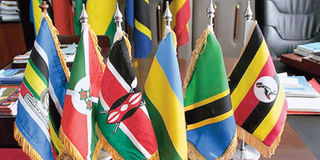Govt issues bold statement against EAC trade barriers

What you need to know:
The remark was made yesterday by the permanent secretary of the Industry Trade and Investment ministry, Prof Adolf Mkenda when releasing findings of the top 100 mid-sized Companies’ survey, whose winners will be named today. Mwananchi Communications Limited (MCL) and KPMG, a global network of professional firms providing audit, tax and advisory services are the main sponsors of the survey.
Dar es Salaam. The government has vowed to respond accordingly to any East African country,which will impose trade barriers for products from Tanzania.
The remark was made yesterday by the permanent secretary of the Industry Trade and Investment ministry, Prof Adolf Mkenda when releasing findings of the top 100 mid-sized Companies’ survey, whose winners will be named today. Mwananchi Communications Limited (MCL) and KPMG, a global network of professional firms providing audit, tax and advisory services are the main sponsors of the survey.
He was reacting to the survey’s findings, which show that 2/3 of 4,000 companies, which participated in the competition have shown interest to expand to the East African markets.
Presenting the survey findings on behalf of KMPG, Research Solutions Africa managing director Jasper Grosskurth said 51 per cent and 38 per cent showed interests to expand to Kenya and Uganda respectively. “Tanzania is totally committed to allow imports from other countries, but we won’t accept to be a dumping place,” noted Prof Mkenda.
“We won’t spare those who will dare impose some barriers for our exports as opposed to the East African Common Market Protocol. They know very well on what can happen,” he said in response of a question on measures that they would take against those countries.
He said the potential benefits of further reducing those obstacles are significant given that the opening of markets was important in boosting trade and economic growth in the region.
Earlier, presenting the findings, Mr Grosskurth said the companies which were surveyed cited high taxation and capital problems contributed to their failure to expand their operations.
Prof Mkenda was quick to respond, saying by the end of the month or early next month the government would streamline all charges by the regulatory bodies like the Tanzania Bureau of Standards (TBS), Tanzania Food and Drugs Authority (TFDA), to mention but a few.
He also warned the Tanzania Revenue Authority not to harass traders.
“We need to change our mentality from deal making system to rule making system. I know it is painful to pay tax, but there is no option, you have to pay the right amount of tax,” noted Prof Mkenda.
On capital challenge, he said the government was set to start walking the talk on new microfinance policy to enable more access of credits to Small and Medium Sized Enterprises.
He called on Tanzanians to do away with myths of focusing on working as servants firsts before venturing into entrepreneurship after retirement in view of gaining experience, network and capital, calling them to start as soon as they complete their studies.
Speaking during a discussion panel on ‘How SMEs feature in Local Content Policy and Tanzania Industrialisation Journey, Tigo Tanzania managing director Simon Karikari said digital technology was a tool of spreading innovations.
He said with technology, Tanzania had all what it takes to build better supply chain to support SMEs by connecting to all suppliers and branches.
“SMEs, who according to the survey are positive about the economy of the country, are bedrock for industrialisation…digital technology can not only speed up the industrialisation process, but also to shorten it,” noted Mr Karikari.
Giving his votes of thanks, Mwananchi Communications Limited managing director Francis Nanai commended government’s efforts in creating friendly business environments.




